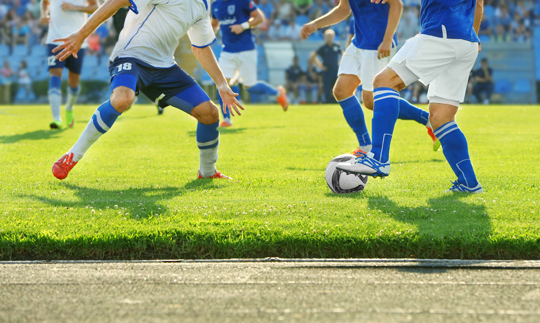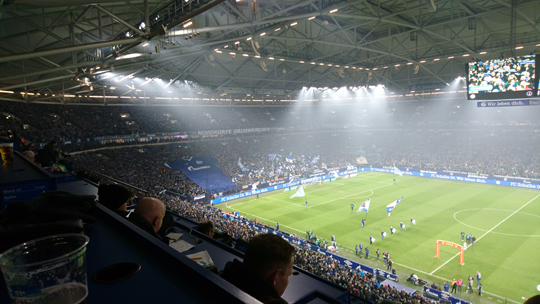Fascinating jargon in soccer
Freiburg, May 06, 2019
The round thing has to go into the rectangular thing? The “Königsblauen” (“royal blues” also known as Schalke) are in crisis? And who is that twelfth man? The language of soccer is more diverse than ever. But not everyone is familiar with the idioms and metaphors that surround this sport. Under the direction of Dr. Göz Kaufmann, a private lecturer and linguist, students at the University of Freiburg studied the linguistic peculiarities of soccer and how they have changed over time. The group examined their results during a four-day excursion to Gelsenkirchen, the home of FC Schalke 04.
 As fast-paced as the game itself: Sportsmen and journalists are constantly finding new terms for the same processes on the soccer field.
As fast-paced as the game itself: Sportsmen and journalists are constantly finding new terms for the same processes on the soccer field.
Photo: Africa Studio/stock.adobe.com
Not everyone who reads sentences such as “Kroos hammered the game equipment [...] humorlessly to 3:0 into the meshes” knows what it means right away. Many will probably still know that Kroos’ first name is Toni and that he is a German soccer player. And because it’s about soccer, the meaning of words like “game equipment” and “meshes” can also be derived. But how do such linguistic variations come about?
Dr. Göz Kaufmann, private lecturer and linguist at the University of Freiburg, and his students investigated questions such as these in the 2018/2019 winter semester. With the help of scientific texts, they dug up faded language images and word games in the linguistic master’s seminar “The Language of Soccer” offered by Kaufmann while analyzing and comparing them with the present on a four-day excursion to Schalke in Gelsenkirchen.
So why did Kroos humorlessly hammer the ball into the goal? According to Kaufmann, the meaning of the word “humorless” changed in this moderator’s commentary: “In this context, it means ‘without much brouhaha’ or ‘in a very tight way’.” And the fact that the ball is termed the ‘game equipment’ and the goal turned into the ‘mesh’ is due to the fact that journalists - no matter whether they work for the radio, television or the printed newspaper - are anxious to describe the eternally same processes and scenes in soccer as variedly as possible. Also exciting: verbs like “hammering” and “nailing” do not occur in the coverage of women’s soccer, the latter certainly also because of possible sexual connotations.
Extensive excursion program
Over the years, soccer has not only become commercialized, but has also changed linguistically. This change had to be traced during the seminar - not only once a week in a seminar room of the Collegiate Building III, but also in working groups and at Schalke. The excursion was a fantastic experience, says student Amelie Bock, because she brought so much knowledge home with her.
A glance at the packed excursion agenda explains why: a stadium tour, the German Soccer Museum, Zeche Zollverein, a match visit with a subsequent press conference, numerous discussions, for example with the fan coordinator and the archivist of FC Schalke 04 as well as with sports editors from the Westdeutsche Allgemeine Zeitung. In between, the students also asked passers-by in Gelsenkirchen about their very personal relationship with Schalke.
 Taking it all in: A visit to the Veltins Arena, the home of Schalke 04, gave the students insights into the game and the history of the club. Photo: Amelie Bock
Taking it all in: A visit to the Veltins Arena, the home of Schalke 04, gave the students insights into the game and the history of the club. Photo: Amelie Bock
Soccer is very pervasive in this city. The students Alexandra Droysen von Hamilton and Fabian Ruhrländer tell of graffiti in blue and white, of drinking halls named after the traditional club, and of burgers called “Ernst Kuzorra’s wife’s burger.” The explanation behind it is that Ernst Kuzorra was Schalke’s top player in the 1930s and 1940s. Having been there made her picture complete, says Droysen von Hamilton.
During these four days, exciting curiosities were unearthed together, for example that soccer at Schalke would be unthinkable without mining. Press conferences traditionally open Schalke’s coaches with the familiar greeting “Glück auf” (a term miners say to one another before going down the mine shaft). The club archivist also told the students how Schalke 04 is still trying to come to terms with his history during the Third Reich. The club was then the best soccer club in Germany, which the National Socialists knew how to promote and exploit.
Soccer language in politics
Göz Kaufmann has already given the seminar for the second time. Of course, he is himself a soccer enthusiast, he says. Schalke memorabilia hang conspicuously next to his desk. As a soccer fan and linguist, he finds it fascinating to observe that expressions and metaphors from the world of soccer are now being used in everyday conversations, for example the saying that someone should “keep the ball down” or “finally score.” Even in politics, soccer has to make snappy statements again and again, for example when it is emphasized that the losses of the SPD strongly remind one of the HSV.
Kaufmann and his students also investigated how a club like FC Schalke 04 communicates and what of it appeals to the fans or how the language in soccer has changed through digital technology: “Does the language in the live ticker suddenly resemble that of a radio presenter, who also has to get by without pictures, or does it follow its own rules?” The students have now taken up the topic in their academic term papers. It will remain exciting to the end.
Stephanie Streif

